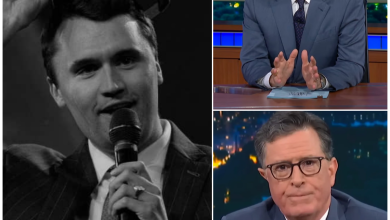‚A Sign of Things to Come?‘: How Stephen Colbert’s Somber Plea Cut Through the Chaos of a National Tragedy
In a world saturated with political commentary, where every voice seems to be shouting, it was a moment of quiet, somber reflection that cut through the noise. Stephen Colbert, the king of late-night political satire and one of America’s most prominent liberal voices, set aside his script, his jokes, and his persona to speak directly to a nation reeling from the assassination of his ideological opposite, Charlie Kirk.
In a rare, last-minute alteration to his show, Colbert delivered a powerful, heartfelt, and chilling message that transcended partisanship, offering not just condolences, but a desperate warning about the dark path America is on.
„After our scripts for tonight’s show were finished this afternoon, we at the Late Show learned that Charlie Kirk, a prominent right-wing activist, was killed at a speaking engagement in Utah,“ Colbert began, his usual wry smile replaced with a look of profound gravity. The statement was simple, factual, and devoid of any political framing. It was a moment of pure, unfiltered humanity in a media landscape already churning with chaotic and divisive reactions.
„Our condolences go out to his family and all of his loved ones,“ he continued, his words carrying the weight of genuine empathy. For a man who has built a career on lampooning conservative figures, this was a powerful demonstration of setting aside politics to recognize a human tragedy. But it was his next words that elevated the moment from a simple expression of sympathy to an urgent national plea, drawing a terrifying parallel to one of the most turbulent and bloody decades in American history.
„I'm old enough to personally remember the political violence of the 1960s,“ Colbert said. „And I hope that it’s obvious to everyone in America that political violence does not solve any of our political differences. Political violence only leads to more political violence.“
He concluded with a message that felt less like a statement and more like a prayer for a nation on the brink. „I pray with all my heart that this is the abhorrent action of a madman,“ he said, his voice filled with a desperate hope, „and not a sign of things to come.“
The power of Colbert’s message was magnified by the chaotic and often graceless reactions seen elsewhere. While Fox News host Megyn Kelly fought back tears on air while reporting the news, others stumbled badly. MSNBC political analyst Matthew Dowd was reportedly fired after calling Kirk one of the most „divisive younger figures“ who pushed „hate speech,“ adding that „hateful thoughts lead to hateful words, which then lead to hateful actions.“ While he later apologized, the comments were widely seen as „insensitive and unacceptable,“ a prime example of the rush to politicize a tragedy before the grief had even set in.
Colbert’s deliberate, human-first approach stood in stark contrast. He demonstrated that it is possible to profoundly disagree with someone’s political ideology while still mourning their murder and defending their right to exist without fear. His words were a masterclass in moral clarity, a reminder that before we are liberals or conservatives, we are human beings, and that the sanctity of life is the bedrock of a functioning democracy.

The tragedy was compounded by a layer of cruel irony that was not lost on social media users. Kirk was assassinated while on stage discussing gun violence. Furthermore, controversial comments he made in a 2023 interview quickly resurfaced, in which he stated, „It’s worth to have a cost of, unfortunately, some gun deaths every single year so that we can have the Second Amendment to protect our other God-given rights.“ This uncomfortable footnote to his legacy added another complex and painful layer to the national conversation, a conversation that Colbert wisely chose to rise above in his initial response.
While critics debated Kirk’s past statements, President Trump mourned the loss of a key ally and supporter, announcing that he would posthumously award Kirk the Presidential Medal of Freedom. The gesture underscored the deep impact Kirk had on the conservative movement and the profound sense of loss felt by his followers.
In an era where every event is immediately filtered through a partisan lens, Colbert’s message was a courageous call to pause. He urged his audience, and the nation at large, to see the assassination of Charlie Kirk not as a political victory or defeat, but as a collective failure. It is a failure of our discourse, a failure of our ability to see the humanity in our opponents, and a failure to contain the violent rhetoric that has become all too common. His somber address provided a rare moment of unifying decency in a media storm of division, a brief but powerful reminder of the shared values that lie beneath the surface of our fractured politics.


